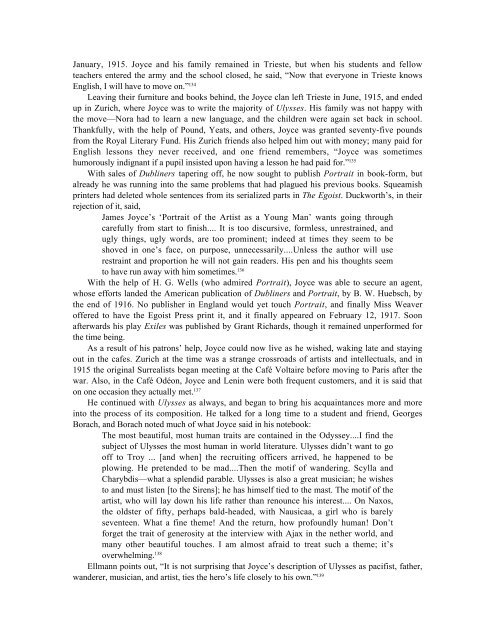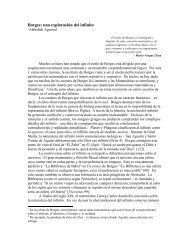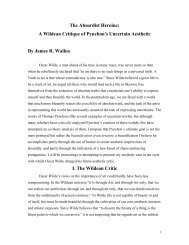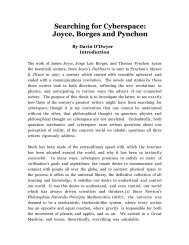And A Very Good Time It Was: A Short Life of ... - The Modern Word
And A Very Good Time It Was: A Short Life of ... - The Modern Word
And A Very Good Time It Was: A Short Life of ... - The Modern Word
You also want an ePaper? Increase the reach of your titles
YUMPU automatically turns print PDFs into web optimized ePapers that Google loves.
January, 1915. Joyce and his family remained in Trieste, but when his students and fellow<br />
teachers entered the army and the school closed, he said, “Now that everyone in Trieste knows<br />
English, I will have to move on.” 134<br />
Leaving their furniture and books behind, the Joyce clan left Trieste in June, 1915, and ended<br />
up in Zurich, where Joyce was to write the majority <strong>of</strong> Ulysses. His family was not happy with<br />
the move—Nora had to learn a new language, and the children were again set back in school.<br />
Thankfully, with the help <strong>of</strong> Pound, Yeats, and others, Joyce was granted seventy-five pounds<br />
from the Royal Literary Fund. His Zurich friends also helped him out with money; many paid for<br />
English lessons they never received, and one friend remembers, “Joyce was sometimes<br />
humorously indignant if a pupil insisted upon having a lesson he had paid for.” 135<br />
With sales <strong>of</strong> Dubliners tapering <strong>of</strong>f, he now sought to publish Portrait in book-form, but<br />
already he was running into the same problems that had plagued his previous books. Squeamish<br />
printers had deleted whole sentences from its serialized parts in <strong>The</strong> Egoist. Duckworth’s, in their<br />
rejection <strong>of</strong> it, said,<br />
James Joyce’s ‘Portrait <strong>of</strong> the Artist as a Young Man’ wants going through<br />
carefully from start to finish.... <strong>It</strong> is too discursive, formless, unrestrained, and<br />
ugly things, ugly words, are too prominent; indeed at times they seem to be<br />
shoved in one’s face, on purpose, unnecessarily....Unless the author will use<br />
restraint and proportion he will not gain readers. His pen and his thoughts seem<br />
to have run away with him sometimes. 136<br />
With the help <strong>of</strong> H. G. Wells (who admired Portrait), Joyce was able to secure an agent,<br />
whose efforts landed the American publication <strong>of</strong> Dubliners and Portrait, by B. W. Huebsch, by<br />
the end <strong>of</strong> 1916. No publisher in England would yet touch Portrait, and finally Miss Weaver<br />
<strong>of</strong>fered to have the Egoist Press print it, and it finally appeared on February 12, 1917. Soon<br />
afterwards his play Exiles was published by Grant Richards, though it remained unperformed for<br />
the time being.<br />
As a result <strong>of</strong> his patrons’ help, Joyce could now live as he wished, waking late and staying<br />
out in the cafes. Zurich at the time was a strange crossroads <strong>of</strong> artists and intellectuals, and in<br />
1915 the original Surrealists began meeting at the Café Voltaire before moving to Paris after the<br />
war. Also, in the Café Odéon, Joyce and Lenin were both frequent customers, and it is said that<br />
on one occasion they actually met. 137<br />
He continued with Ulysses as always, and began to bring his acquaintances more and more<br />
into the process <strong>of</strong> its composition. He talked for a long time to a student and friend, Georges<br />
Borach, and Borach noted much <strong>of</strong> what Joyce said in his notebook:<br />
<strong>The</strong> most beautiful, most human traits are contained in the Odyssey....I find the<br />
subject <strong>of</strong> Ulysses the most human in world literature. Ulysses didn’t want to go<br />
<strong>of</strong>f to Troy ... [and when] the recruiting <strong>of</strong>ficers arrived, he happened to be<br />
plowing. He pretended to be mad....<strong>The</strong>n the motif <strong>of</strong> wandering. Scylla and<br />
Charybdis—what a splendid parable. Ulysses is also a great musician; he wishes<br />
to and must listen [to the Sirens]; he has himself tied to the mast. <strong>The</strong> motif <strong>of</strong> the<br />
artist, who will lay down his life rather than renounce his interest.... On Naxos,<br />
the oldster <strong>of</strong> fifty, perhaps bald-headed, with Nausicaa, a girl who is barely<br />
seventeen. What a fine theme! <strong>And</strong> the return, how pr<strong>of</strong>oundly human! Don’t<br />
forget the trait <strong>of</strong> generosity at the interview with Ajax in the nether world, and<br />
many other beautiful touches. I am almost afraid to treat such a theme; it’s<br />
overwhelming. 138<br />
Ellmann points out, “<strong>It</strong> is not surprising that Joyce’s description <strong>of</strong> Ulysses as pacifist, father,<br />
wanderer, musician, and artist, ties the hero’s life closely to his own.” 139





